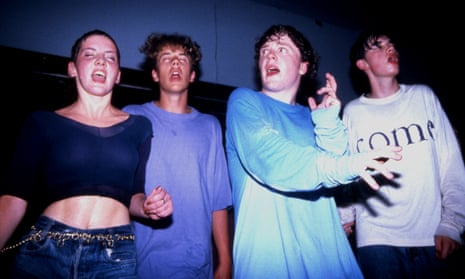On Thursday night last week, Sea Power played a headline gig at the Roundhouse in London, a Grade II-listed former engine shed. A beautiful space and an important centre for youth arts education, it’s one of live music’s success stories.
A week later, the band will play at Sheffield’s Leadmill, the centre of a bitter row after the venue’s landlords issued a notice of eviction. Arctic Monkeys, Pulp and the Kaiser Chiefs have all joined a campaign to save the Leadmill, in the vein of dozens of similar efforts over the years to save famous venues, from Manchester’s Haçienda to London’s Fabric nightclub and CBGBs in New York. Many smaller venues have shut after these battles failed. The Bull & Gate, where I first saw Sea Power play 20 years ago, was a pub just up the road from the Roundhouse, and is now closed, a fate shared by many rooms they’ve haunted during their long career.
After a battering from coronavirus, live music in the UK continues to struggle, with audiences wary of returning to crowded gigs, and grassroots venues taking on £90m of debt just to survive. A crowdfunding campaign by the Music Venue Trust has raised nearly £4.5m for 270 projects across the country.
It can often feel that the picture for live music in Britain is beyond bleak, but it’s more complex than it can at first appear: it’s not just the fault of the usual culprits such as greedy landlords, property developers and moaning neighbours.
The decline of regional touring reflects how, in an age of Netflix and gaming, live music now has to compete with far more demands on our cultural time and interest, not to mention wallets, in the middle of a cost-of-living crisis. Old tour adverts show that bands would play numerous dates in one city, and visit places that no longer have live venues. The Wake Arms, in the middle of Epping Forest, once hosted gigs by Hawkwind and Genesis, while the now demolished West Runton Pavilion, out on the north Norfolk coast, welcomed the Sex Pistols, Chuck Berry and Black Sabbath.

A friend’s uncle who works in one of the shipyards in Plymouth told me the city’s problems went hand in hand with the decline of its music venues. He used to be able to watch bands such as the Fall every week – now most acts tend to travel only as far as Exeter. Without a musical culture, any region suffers.
It’s easy to get misty-eyed about buildings, and some, such as the Haçienda, get elevated along with the nostalgia and myth-making for the scene they hosted. Friends who went to the club say that when it opened in 1982 it was often depressingly empty, and before closing in 1997 it had a nasty, heavy vibe, far from the euphoria of its acid house peak. There was widespread anger when London’s Astoria was demolished to make way for Crossrail, yet it was a dilapidated box I remember only for bad sound, overcrowding and overpriced warm lager in cans. Venues come and go, and have their good and terrible phases.
The churn of cities is part of what makes them exciting places to live, and that process is often more tricky than we might assume. In 2019, there was a campaign to save the Macbeth on London’s Hoxton Street after noise complaints from neighbours. However, when I lived around the corner in the early 2000s, the Macbeth was a genuine community boozer with an amazing karaoke night, and one year everyone sang me Happy Birthday. It was a blow when it became a music venue, and the formerly mixed crowd was dispersed.
When venues serving marginalised people are closed, there tends to be less press outrage or campaigning to save them – the excellent if depressing Instagram account London Dead Pubs, full of before-and-after photographs of old Victorian drinking establishments replaced by anonymous flats, gives the histories of countless venues that served the black community with reggae and dub nights but were shut down with little in the way of mainstream protest. Whether they served a particular group of people, nurtured a musical movement, or (let’s not be snooty) a room where a covers band could get out of themselves for an hour of musical fantasy, the crime is that venues are rarely replaced, leaving many towns and cities without large and grassroots spaces alike.

Look beyond the doom and gloom, and the picture is more mixed. In Sheffield, new venues are being created in the redevelopment of the city centre, while Sidney & Matilda, Delicious Clam and Bal Fashions opened fairly recently and are all thriving. Cafe Oto, the London home of experimental music, has just celebrated its 14th birthday. In Yorkshire and Lancashire, the Transpennine underground is sustained by Hebden Bridge’s The Trades Club, Todmorden’s Golden Lion and Manchester’s notoriously feral White Hotel. Like Camden’s Roundhouse, Newcastle’s Boiler Shop saved an important part of our industrial heritage (the first steam locomotives were built there) and puts on industrial music from the likes of Einstürzende Neubauten alongside the wildly popular Bongo’s Bingo. These venues, providing services and entertainment beyond just music, show how it’s possible to adapt to survive.
When I look back at the life-changing musical moments in my life (the uncanny murmur of Throbbing Gristle at Heaven, still dancing four hours before I had to get up for work every Monday at Trash at long-closed nightclub The End), it’s not the physical space I remember but the vibrating molecules, the feeling of collective joy within them. The same thing happened at the Roundhouse when, during their pro-immigration anthem Waving Flags, Sea Power lifted the roof off. Music venues are the incubators of connections and memories. As fans of music of all stripes, we need not just to lament the past but support those trying to do something new.
Luke Turner is co-founder of music website the Quietus and author of Out of the Woods









